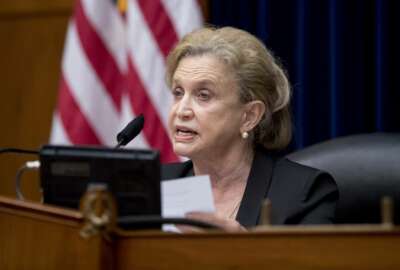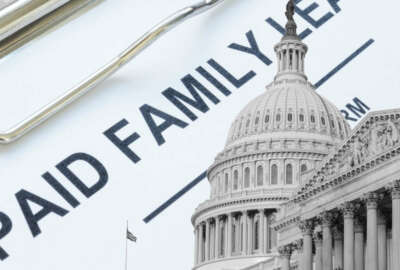Expanding paid family leave for federal employees faces tough, heated fight
House Democrats argue the pandemic has shown the need for paid family and medical leave, but Republicans say the benefits federal employees have are already too...
House Democrats have renewed the fight to expand paid family leave for federal employees this year, but they haven’t yet found many bipartisan partners — at least not yet.
House Oversight and Reform Committee Chairman Carolyn Maloney (D-N.Y.) introduced the Comprehensive Paid Leave for Federal Employees Act earlier this year.
The bill provides up to 12 weeks of paid time off to care for a sick spouse, child or parent — or for the employee’s own personnel medical condition.
It essentially replaces the 12 weeks of unpaid leave federal employees have now under the Family and Medical Leave Act with paid time off. The legislation also expands the 2019 law that granted paid parental leave to most federal employees to the entire workforce. Postal Service workers were left out of the original law.
But if Thursday’s debate before the House Oversight and Reform Committee is any indication, the paid family leave bill faces a potentially tough and heated fight.
“Oversight Democrats have called a hearing on enhanced work perks for federal bureaucrats,” James Comer (R-Ky.), ranking member of the House Oversight and Reform Committee, said. “That’s right, more benefits for federal employees who already enjoy job security and a lavish set benefits not afforded to most American workers.”
“This is not a perk we’re talking about,” said Maloney, who continues to field phone calls from federal employees about the status of her bill. “What we’re talking about [are] balanced policies, that I will say that most countries in the world already have, even third world countries. We’re the greatest country in the world; can’t we respect our workers?”
For Maloney, the fight for paid leave for federal employees and others has been a long and personal one.
She was the original co-sponsor of the Federal Employee Paid Leave Act, which kicked in for much of the workforce last October.
For Democrats, the pandemic has proven the case for permanent, paid family and medical leave benefits for federal employees.
“We don’t want people going to work when they’re sick, and you would have thought COVID-19 would have taught us that,” said Rep. Jamie Raskin (D-Md.).
Research shows employees who have paid sick and medical leave are often more productive when they return to work, Vicki Shabo, senior fellow for paid leave policy and strategy at New America’s Better Life Lab, said.
But Republicans are highly skeptical. It’s unclear how much the bill would cost, and Republicans argued federal employees already have too many workplace flexibilities.
“Now today we’re looking at ways to give federal employees even more time off on the backs of the American taxpayer,” said Rep. Jody Hice (R-Ga.), ranking member of the government operations subcommittee. “Democrats’ agenda for federal workforce issues can be summarized as this: Come to work as little as possible, and when you do come, don’t worry about doing your job. That’s where we’re going with this thing.”
Hice is especially critical of the Biden administration’s plans to create a hybrid federal workforce, where telework and remote work programs are permanent flexibilities for some employees after the pandemic.
He wrote to inspectors general across government on Thursday, asking them to review the impact of telework on agencies’ missions and operations.
“As the Biden administration moves forward with its return-to-work plans, this information is vital to understanding potential impacts on the level of service Americans can expect,” Hice wrote in 10 letters to agency IGs.
Democrats on Thursday argued paid family and medical leave is vital to recruit and retain federal employees, a goal they said is especially important as the workforce ages.
But for Republicans, federal employees already have too many paid days off.
Federal employees have 12 paid holidays this year, including Juneteenth National Independence Day, which Congress and the White House made official last week for the first time.
“Combined with federal holidays and annual leave, federal employees now have to work about eight months out of the year?” Hice said. “Are you kidding me? This is absolutely insanity, and this is what we’re told is leading by example?”
It’s highly unlikely that all federal employees would take the full 12 weeks of paid leave each year, Everett Kelley, national president of the American Federation of Government Employees, said.
“Every federal employee will not be able to take four months of leave. That’s not what this law is about,” he said.
The paid family leave bill would require federal employees to work at least 12 months for the government before taking time off.
“Workers need paid leave to recover from serious illnesses, to take care of sick children and to deal with the sudden military deployment of a family member,” Maloney said. “Having a seriously-ill child is not a perk. Taking time to deal with active-duty deployment is not a perk. As our nation seeks to recover from the pandemic, permanent, comprehensive paid leave is essential to support workers and the families who depend on them.”
Copyright © 2025 Federal News Network. All rights reserved. This website is not intended for users located within the European Economic Area.
Nicole Ogrysko is a reporter for Federal News Network focusing on the federal workforce and federal pay and benefits.
Follow @nogryskoWFED





